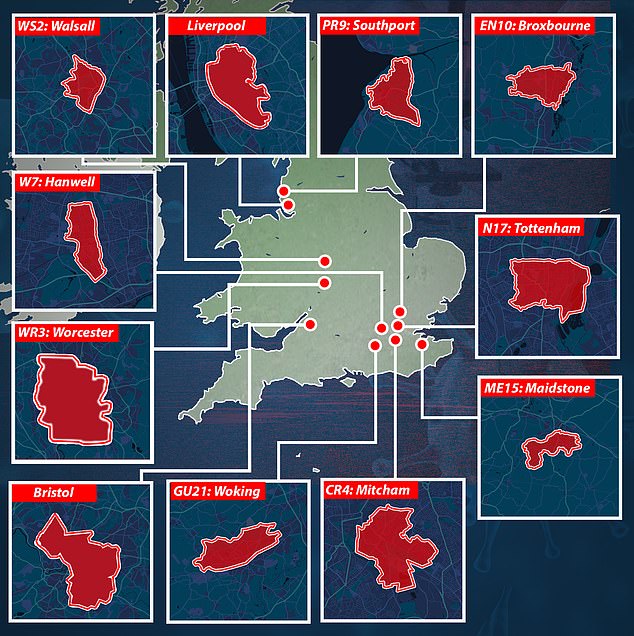Coronavirus strain found in Bristol that is similar to South African virus is listed as a ‘variant of concern’ and has been spotted 21 times across the UK
- New Bristol variant adds to confusion of virus types circulating in Britain
- It is characterised by key mutations from Kent and South Africa variants in one
- This suggests it could spread fast and also get past immunity from vaccines
The mutated coronavirus variant first found in Bristol has been labelled a ‘variant of concern’ by UK scientists today.
Public Health England said it has now found 21 cases of this version of the virus, with 14 in Bristol and the South West, four in Manchester and three unknown.
It is a version of the Kent variant – the dominant strain of the virus in England – which has mutated further to develop a change first found on the South African strain which may make vaccines less effective.
Because of this mutation named E484K, which also raises the risk of people getting reinfected after they already had Covid-19, experts are desperate to stamp it out.
It becomes the third variant of concern found in Britain, alongside the now-dominant Kent variant and the South African one. A fourth – one of two strains from Brazil – is also listed by Public Health England but it has not yet been found in the UK.
Experts said they were worried about the Bristol variant’s combination of mutations because it would be ‘at least as transmissible’ as the fast-spreading Kent variant but also potentially able to dodge immunity from vaccines.
Although it is not likely to take over and become dominant now, there is a risk it could come through when the Kent strain has been suppressed by vaccinations.
The Department of Health announced today it had finished its surge testing – which is used to weed out these variants – in Woking, but started it in Lambeth, London.
The Government has deployed surge testing to areas where the South African variant, or ones with similar mutations, have been found in the community. Professor Van-Tam reassured viewers that only a ‘small number’ of cases have been discovered
The spread of differing variants across Britain is causing a storm now because of the risk that one will render the long-awaited vaccines less effective.
And the fact that they have been discovered during lockdown, said PHE’s Dr Susan Hopkins, was a cause for immediate action because it presented an opportunity to control them while people are not mixing much.
‘It is reassuring [that] we aren’t seeing week-on-week increases in either of them and the data is staying flat,’ Dr Hopkins told a briefing today.
‘I think why we’re getting on top of these now is because the R is below one… when we release in March, April and May, things will be more challenging.’
While none of the variants of concern look to be spreading fast out of the areas where they were first discovered, this could change when rules are eased.
Professor Nick Loman, a genomics expert at the University of Birmingham, member of COG-UK and PHE adviser, added: ‘What applies in a lockdown is not necessarily going to be true when we relax measures. The fact that the South African variant is not doing well now doesn’t mean it won’t [when lockdown ends].’
